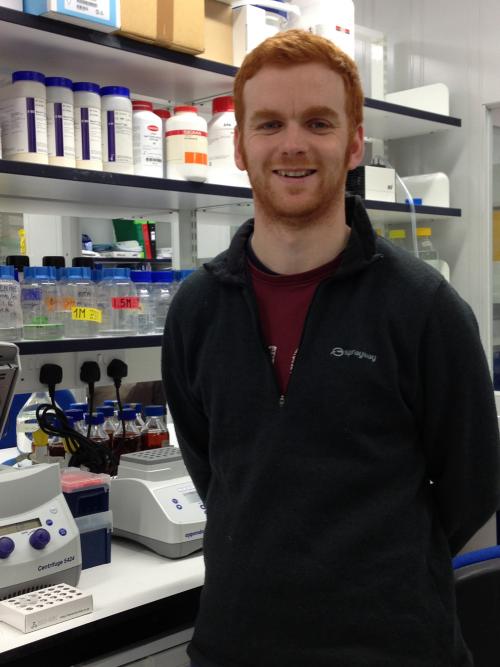
Tom Deegan, who has been working as a postdoctoral fellow in Karim Labib's laboratory since May 2015, has been awarded a Sir Henry Wellcome Postdoctoral Fellowship (£250,000 over 4 years).
This is one of the most highly sought after postdoctoral fellowships in the UK. It offers the most talented recently qualified postdoctoral researchers a unique opportunity to start an independent research career, “working in some of the best research environments in the world”.
Tom undertook his PhD research in John Diffley’s group at the Clare Hall Laboratories of Cancer Research UK’s London Research Institute. Whilst here, he utilised a novel reconstituted DNA replication system that uses 42 purified proteins from budding yeast to define the role of the Sld3 protein during the initiation of DNA replication.
Tom is now taking steps to extend the in vitro DNA replication system in new directions, to dissect the mechanism and regulation of DNA replication termination. Tom also plans to collaborate with Steve Kowalczykowski in California and Ian Hickson in Copenhagen during the course of his project.
Tom stated "I am delighted to have been awarded this fellowship from the Wellcome Trust, and am excited by the challenge of pursuing an independent research programme during my postdoc. I would especially like to thank Karim Labib for his support during the application process, and look forward to continuing to work with him on this project.”
Dario Alessi commented “the research that Tom is undertaking that involves reconstituting a complex biological system requiring over 60 recombinant proteins, is at the cutting edge of biological investigation. I am delighted that Tom was able to secure this very prestigious fellowship that required him to defend his proposed work at an interview in front of an illustrious panel of scientists. I am confident that Tom’s unique experience and ability will help him drive our understanding of the fundamental mechanism of how DNA replication termination is controlled.”

